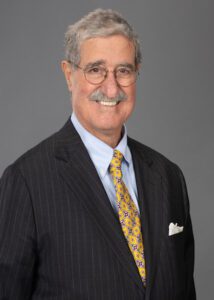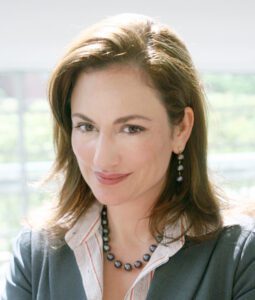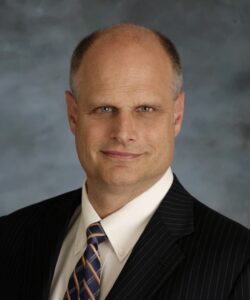Spring 2023 ADR Speaker Series
In collaboration with key institutional partners, The Center for Negotiation and Dispute Resolution (CNDR) hosted a brand new Spring 2023 ADR Speaker Series. This public talk series featured eight influential thought leaders from around the country and abroad, presenting new ideas and cutting edge research to members of the UC Law SF community and the general public. The ADR Speaker Series was held in conjunction with an Advanced ADR Colloquium course for students, taught by CNDR’s Director, Professor Hiro Aragaki.
 January 24: Bargaining with the Devil… To End Putin’s War
January 24: Bargaining with the Devil… To End Putin’s War
Robert Mnookin, Williston Professor of Law; Director, Harvard Negotiation Research Project; Chair, Program on Negotiation at Harvard Law School.
Professor Mnookin, a long-renowned authority on negotiation and mediation, examined how mediators should respond when confronted with a party who is truly a “bad actor.” Drawing on his acclaimed book, Bargaining with the Devil: When to Negotiate, When to Fight, he used Putin’s war in in Ukraine as a case study to raise broader questions of relevance to practicing mediators, such as how to maintain neutrality and professional detachment when our own values may be deeply offended, and the types of persuasion can be brought to bear when faced with a party who takes a morally reprehensible position. Co-sponsored by The Mediation Society.
 January 31: Reconceptualizing the Party-Appointed Arbitrator and the Meaning of Impartiality
January 31: Reconceptualizing the Party-Appointed Arbitrator and the Meaning of Impartiality
Catherine Rogers, Professor of Law, Bocconi University, Milan, Italy.
Drawing on Legal Realism’s insight that decision-maker “bias” is a necessary corollary of law’s inherent indeterminacy, Professor Rogers proposed moving beyond current debates about whether party appointed arbitrators are in fact biased, and toward more nuanced questions such as who decides which forms of bias are legitimate and how we police the boundary between legitimate and illegitimate bias in arbitrator deliberation. She reconceptualized party appointed arbitrators as an essential structural check against the inevitability of bias in all decision-making. Co-Sponsored by CalArb.
 February 14: The Enforcement of Metaverse-Related Disputes that are Resolved in International Arbitration
February 14: The Enforcement of Metaverse-Related Disputes that are Resolved in International Arbitration
Elizabeth Chan, Senior Registered Foreign Lawyer, Allen & Overy, Hong Kong.
Ms. Chan discussed the implications of the metaverse—poised to become a trillion dollar industry—for the New York Convention’s award enforcement regime. She explained the various types of metaverse-related disputes that currently exist, such as between users, between users and platforms, and between users and non-users, involving anything from ordinary breach of contract to digital assets such as cryptocurrency and non-fungible tokens (NFTs). She posed new questions about the implications of such disputes for traditional concepts such as party autonomy, due process, and the legal seat. Co-Sponsored by CalArb.
March 14: Can Mediators Promote Anti-Racism Within the Confines of Neutrality?
Ellen Deason, Joanne Wharton Murphy/Classes of 1965 and 1973, Professor in Law Emerita, The Ohio State University Moritz College of Law.
Professor Deason examined some of the systemic ways in which white privilege is expressed in the practice of mediation. Using the lenses of tone policing, color-blindness, and white silence she reflected on aspects of mediation such as expressions of anger, forward-looking focus, and mediator bias. Co-sponsored by AAA-ICDR.
March 21: Could Lawyers’ Court-Connected Negotiations Represent the ‘New Mediation’?
Nancy Welsh, Frank W. Elliott, Jr. University Professor, Professor of Law, Director of Aggie Dispute Resolution Program, Texas A&M University School of Law.
Drawing on new empirical data, Professor Welsh argued that bilateral settlement negotiations—traditionally conducted between lawyers—increasingly appear to include clients. She suggested that this modern, “client-inclusive” version of lawyers’ settlement negotiations may be superior to the modern, more evaluative model of mediation—on many of the same metrics that were used originally to advocate for mediation. Perhaps then, just as arbitration has become the “new litigation” and mediation has become the “new arbitration,” so too lawyers’ client-inclusive negotiation could represent the “new mediation.” Co-sponsored by The Mediation Society.
April 11: The Future is Digital: Online Dispute Resolution and Decentralized Justice
Janet Martinez, Senior Lecturer in Law and Director of the Martin Daniel Gould Center for Conflict Resolution at Stanford Law School.
Colin Rule, CEO mediate.com and arbitrate.com.
As the pandemic forces public and private institutions to move online, many court and business leaders are looking to the field of online dispute resolution (ODR) for best practices and lessons learned. Professor Martinez and Mr. Rule provided an overview of the history of ODR’s development and explored the range of tools and techniques encompassed by online dispute resolution. They raised key questions and ethical challenges facing the design and governance of ODR systems. Co-sponsored by mediate.com.
April 18: Mediation Begins with Me: A Look at Self Reflection, Self Management and Self Compassion
Bruce Edwards, Co-Founder of JAMS and Co-Founder of Edwards Mediation Academy.
Mr. Edwards discussed the importance of attending to emotions in mediation. He suggested that the key to developing mediation competency begins with honest self-reflection and thoughtful emotional self-management. Drawing on insights from Christopher Germer’s book, the Mindful Path to Self-Compassion, he illustrated how to design and implement a life-long commitment to self-reflection and personal development—a journey that he described as beginning with “me.” Co-sponsored by JAMS.
